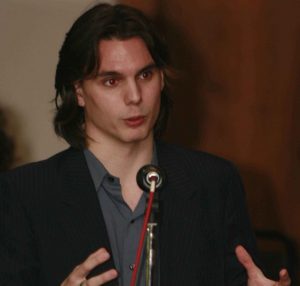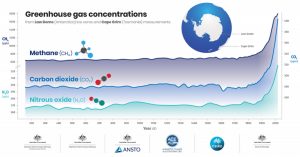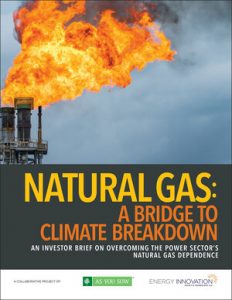As we struggle with disease, crash & climate disaster: what next? UK activist Shaun Chamberlin on new film “The Sequel: What Will Follow Our Troubled Civilization?” Then: stop worrying about the Arctic methane bomb, says scientist Michael Dyonisius.
Listen to or download this Radio Ecoshock show in CD Quality (57 MB) or Lo-Fi (14 MB)
The world trembles at the edge of the largest pandemic since the Spanish Flu of 1918 when millions died. The stock market is shuddering under the strain of a shut-down of the world’s workshop in China, and possibly Japan and South Korea. Right now giant corporations are warning they will make less money than planned. In fact, some debt-laden monsters will probably not survive at all, leading to massive job losses.
Various countries, including the UK and the northern U.S. have been hit with extreme precipitation events at the same time. If China’s industrial pollution continues at a lower rate, and airline traffic tanks, we may get more extreme warming and possible heat waves in the Northern Hemisphere earlier than this summer. Add in general discontent and protests ramping up even before the COVID-19 virus arrived, plus a few million refugees already trickling from Syria toward Europe, and we have the perfect storm.
Will the consumer bomb that threatened the climate and species of the world stumble? What could replace it: an authoritarian dystopia, or a better more human way. Shaun Chamberlin brings us more of his “dark optimism” and a way forward in the new film, “The Sequel”. That is coming up next.
Later in the show I bring you science with very good news and some sort of a hope. A study just released suggests you do no have to worry about a rapid rise of methane thawing out of the Arctic – least not in this century. Michael Dyonisius and his team say frozen methane on the sea bed will not reach the atmosphere, and thawing permafrost is not behind the recent rise in this dangerous greenhouse gas. We have found the real enemy, and it is us. Methane from the fossil fuel industry, and more from tropical bogs we are heating up, is the real worry. At least we can still control methane emissions from the oil and gas industry, if our governments chose to do so, and we all helped.
SHAUN CHAMBERLIN – THE SEQUEL
On Radio Ecoshock, March 2019, Shaun Chamberlin told us about the amazing “Lean Logic” provided by the late UK alternative economist David Fleming. It points to a way out – a path to a future you would actually like to live in. Now Shaun is back with a big release this March. The keystone is a new film called “The Sequel: What Will Follow Our Troubled Civilisation?” created by an award-winning British Director, and based on the work of David Fleming.
Shaun advises groups from Chelsea Green Publishing to the UK Department of Energy and Climate Change. He co-authored a report to Parliament & co-founded Transition Town Kingston. Shaun heads the Fleming Policy Centre, and continues his seminal blog “Dark Optimism”.

Activist, author Shaun Chamberlin
Listen to or download this 28 minute interview with Shaun Chamberlin in CD Quality or Lo-Fi
On March 16, you should be able to stream a presentation by Shaun Chamberlin, Caroline Lukas and more from the Extinction Rebellion web site at rebellion.earth.
SHAUN’S BOOKS
Shaun published a compendium of the work of David Fleming as “Lean Logic – A Dictionary for the Future“. But it might be better to start with Shaun’s introduction, a second book – a shorter guide to Fleming’s work, called “Surviving the Future: Culture, Carnival and Capital in the Aftermath of the Market Economy“
HIS NEW FILM: THE SEQUEL
“The Sequel: What Will Follow Our Troubled Civilisation?”, with guests Caroline Lucas MP, Kate Raworth and Rob Hopkins joining Shaun and the film’s director Peter Armstrong for an event livestreamed globally by Extinction Rebellion, first screening March 16.
SHAUN ON RADIO ECOSHOCK
Check out my full one hour interview with Shaun in the Radio Ecoshock show “Surviving the Future – Shaun Chamberlin”, published on March 27, 2019.
SEE ALSO: This transcript of my 2010 interview with Shaun Chamberlin.
REMEMBER MICHEL FOUCAULT AND HIS LESSONS FROM THE PLAGUE?
In his book “Discipline and Punish” The French philosopher and historian Michel Foucault explained how the plague in the Middle Ages enabled a more coordinated authoritarian state as a necessary response to disease. Could that happen again?
The end goal of the authoritarian state according to Foucault is the Panopticon, the prison where the jailers can see every aspect of the prisoners’ lives, without those in control ever being visible to their victims. In Foucault’s dystopia, the crowd is abolished. Fast-forward to the facial-recognition of everyone everywhere, not just in China, but developing all over the world, plus massive computer files on each individual, and we need all that to track everyones’ travel and contacts to slow infection, and are we not already arriving in the Panopticon?Experts advise business to switch to work-at-home solutions. Is Covid-19 merely cementing a trend toward self-isolation, as we are more attached to a virtual reality, instead of human contact?
Does anyone remember Foucault? Does our history of intellectual development in Europe – existentialism, Derrida and all that, just collapse into a pile of forgotten words? Is there a sequel for the intellect? There is a tension between a strong desire for localization and yet a need to deal with global problems, whether it’s a pandemic of climate change. Is there a lean logic to resolve this?
==================================================================================================
MICHAEL DYONISIUS – FORGET THE ARCTIC METHANE MONSTER (for now)
Have you worried that a big burp of methane will boil out of the Arctic Sea and roast us all with sudden heat? You know, the Arctic methane bomb hypothesis. Brand new science, published in the top journals, concludes that is not going to happen any time soon. Even though a couple of Russian scientists have pushed this fear – is it a distraction from that country’s massive methane emissions from natural gas production and pipelines? The real methane we have to fear is coming from the oil and gas industry, says Michael Dyonisius, lead author or co-author in both those new studies. For anyone concerned about climate change, this interview is stunning good and bad news.
Listen to or download this 27 minute interview with Michael Dyonisius in CD Quality or Lo-Fi
Methane, says scientist Michael Mann, is powering up to 28% of the record warming of this planet. Two new papers pinpoint the real culprit: the oil and gas industry. This is very big new science. The bad news is methane is warping world weather. The good news it is us, and not yet nature, who causes and controls emissions of this greenhouse gas, at least 28 times more powerful than carbon dioxide.

It all comes in two new papers based on two projects measuring air from ice cores from Greenland and Antarctica. Our guest Michael Dyonisius led one paper and co-authored the other. Michael is a PhD Candidate at the University of Rochester, a private research university in New York State.

Scientist Michael Dyonisius, Rochester
We discuss these two papers: “Old carbon reservoirs were not important in the deglacial methane budget” (published February 21, 2020 in Science; and “Preindustrial 14CH4 indicates greater anthropogenic fossil CH4 emissions’”, published: 19 February 2020 in Nature.
In the first (”Old carbon reservoirs….) the authors write:
“Our results show that methane emissions from old carbon reservoirs in response to deglacial warming were small (<19 teragrams of methane per year, 95% confidence interval) and argue against similar methane emissions in response to future warming. “
Essentially the scientists laboriously studied air captured in over 150 tons of ice cores taken from Antarctica to measure the amount of methane in the atmosphere during the most recent warm period between 18,000 and 8,000 years ago, when Earth was about half a degree warmer than today. There was not a lot of methane there, meaning the clathrates did not burp up methane from the ocean floor, even when it was significantly hotter. Dyonisius told journalist Warren Cornwall ““That’s one climate catastrophe we can check off”.
Plus, Dyonisius tells us other science indicates that even if more methane escapes from it’s frozen form on the sea floor, it will likely be captured and used by biological organisms in the sea, before it an reach the ocean surface and the atmosphere. We had a test case, Michael tells us in this interview, when during the Deep Water Horizon accident in the Gulf of Mexico, the oil company BP accidentally drilled into a large methane pocket below the sea. But very little methane reached the surface.
You may say “yes, but this warming is much faster”. But perhaps not. Science has found periods where the Arctic warmed 5 degrees C. in less than a century, much faster than today. But there was not a mass release of methane then. This paper, if proven true by more research, would undercut the work of AMEG, the Arctic Methane Emergency Group, and reduce the hysteria of those who claim humans will become extinct within ten or twenty years.
This new science casts doubt on the work of Russian scientists Natalia Shahkova and Igor Semilietov. Their original research was funded by the Russian Government. I have said several times: we need to see more Russian research and transparency on leaks from their natural gas production, pipelines and storage instead of more voyages to the Arctic sea to measure bubbles.
In the second paper, led by Benjamin Hmiel (”Preindustrial ..) the authors find the…
“result indicates that anthropogenic fossil CH4 emissions are underestimated by about 38 to 58 teragrams CH4 per year, or about 25 to 40 per cent of recent estimates. Our record highlights the human impact on the atmosphere and climate, provides a firm target for inventories of the global CH4 budget, and will help to inform strategies for targeted emission reductions.”
Read a good science-based article on this new paper here, by Warren Cornwall.
That means the human oil and gas industry is responsible for a large share of the current rise of methane in the atmosphere. The rest is coming from tropical bogs that are heating up, especially in East Africa. We learned that from atmospheric tester Euan Nisbet in his Radio Ecoshock interview on March 6, 2019. Find that interview here.
This new science from Michael Dyonisius on the human sources of methane certainly match up with what we heard from Cornell’s Robert Howarth, and from scientists who took air samples over gas fracking hot-spots. We also have measurements of natural gas leaks in old city pipelines in places like Baltimore. And listen to this 23 minute interview with energy journalist Nick Cunningham. In my show broadcast January 30, 2020 Nick revealed the American gas frackers are simply venting vast quantities of methane straight into the air!
All this is backed up by this Tweet from scientist Zeke Hausfather @hausfath:
“Brandt et al 2014 suggested that actual leakage from natural gas systems was between 1.25 and 1.75 times larger than official inventories, implying a leakage rate of between 1.9% and 2.6%. A recent review by Alvarez et al 2018 found a similar leakage range of 2% to 2.7%. “
The Alvarez paper “Assessment of methane emissions from the U.S. oil and gas supply chain” is here.
Each of us will have to switch away from natural gas to save the atmosphere and our future. Some California cities no longer allow new natural gas appliances due to the methane threat to climate. Europe must find another way to heat itself.
The shareholder advocacy group “As You Sow” and nonpartisan policy think-tank “Energy Innovation “ just released this: “Natural Gas: A Bridge to Climate Breakdown” – a report addressing the opportunities presented by the clean energy transition and the risk of over-reliance on natural gas for utilities.

SOME SOLUTIONS?
Geothermal energy, (as tested in my new course “Build A Geothermal Greenhouse In You Back Yard) might help Europeans stay warm. But the Net Zero homes built by visionary architects like Radio Ecoshock guest Guido Wimmers do not even need a furnace (in the high country of Austria). We can move away from our dependence on natural gas. That will reduce methane emissions, and help prevent warming fairly quickly.
PASSIVHAUS NET ZERO WORKSHOP Architect Guido Wimmers on Passivhaus and Olympic’s Austria House. Workshop 100320 Vancouver.
Part 1 49 min Lo-Fi 11 MB: https://www.ecoshock.org/downloads/cities/ES_Passivhaus_1_LoFi.mp3
Part 2 Lo-Fi 9 MB https://www.ecoshock.org/downloads/cities/ES_Passivhaus_2_LoFi.mp3
Guido Wimmers Ecoshock interview from 100402 show, 21 min Lo-Fi 5 MB
Frankly I find it hard to believe that permafrost currently thawing across the North will not release significant amounts of methane. We have had scientists on this show explaining why it will. As I tried to make clear in this interview, I would not say the science on what will happen with Arctic methane is totally settled. The actual numbers about methane in past warmer climates is not in dispute. But some other scientists still question whether this applies to the present.
I agree that the real threat is our unregulated emissions from the natural gas industry, and the oil industry that vents gas. A string of expert guests on Radio Ecoshock shows methane billowing into the air above natural gas production sites, all along the pipeline and storage system, and from old city distribution pipes. The oil and gas industry is risking a rapid warming of the planet by releasing far more methane than anything in the Arctic – and we can do a lot to stop that. Get off the gas!
COMING UP ON RADIO ECOSHOCK
Next week I will be planting a lot more seeds in my geothermal greenhouse. I will also start putting a lot of nutritious soups into canning bottles to ride out any shortages after the inevitable food panic at the supermarkets. That’s right, this year there is a spring canning season. Capture what you can and store it without needing electricity, as your prepare for a possible quarantine from CORVID-19.
Next week on Radio Ecoshock? Who knows. We will all be caught up in the Corona virus panic. I am set to interview the single best teacher on Corona on YouTube, Dr John Campbell from the UK.
No doubt so-called natural disasters, which are anything but natural, will continue to strike even as humans hunker down during the pandemic, like the Tornado that killed at least two dozen people in Tennessee this week. Deep greens are hoping this deadly economic system will topple over to give us something better. Most people are hoping the banks do not collapse, and maybe we will still have jobs by the time summer comes.
How’s that for dark optimism? I’m Alex Smith. See you next week, on Radio Ecoshock.
Please help keep this radio program going out free to people all over the world. You can become a sustaining member for just $10 a month, or make a donation of any amount.
 
Great show, Michael Dionesius, scientist, could really explain himself very well, and you let him run with it. On the methane burp, you could have clarified or asked Michael about East Siberian Sea Shelf (avg depth 58 m) sub-ocean frozen methane. I have heard Shakova explain in great detail that as the shallow waters warm, the permafrost seabed thaws and releases massive methane and 50m of ocean depth does not allow enough time for the methane to oxidize, (like from DeepWater Horizon disaster. Thats the big difference. It definitely does not allow us to check off that pending climate catastrophe, imo, esp as arctic oceans warm, ‘blobs’ it lingering off Alaska, 30% of sea ice volume remaining.
Pingback: THE SEQUEL – What Will Follow Our Troubled Civilization? « ASPO Sverige
Pingback: Debunked: The Methane Monster - Scientists' Warning